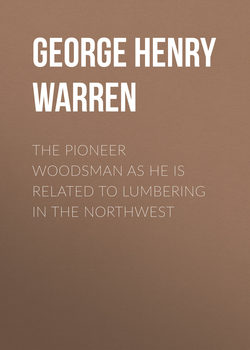Читать книгу The Pioneer Woodsman as He Is Related to Lumbering in the Northwest - George Henry Warren - Страница 4
CHAPTER II.
Preparations for the Wilds of Wisconsin
ОглавлениеIn the city of Detroit, early in June, 1871, was gathered a group of four veteran woodsmen of the lumbermen's craft, and two raw recruits, one, a student fresh from his father's law office in Bay City, and the other, myself, whose frontier experiences were yet to be gained.
A contract, by William S. Patrick of Bay City, the principal of this group, had been made with Henry W. Sage, of Brooklyn, New York, to select and to secure by purchase from the United States and from the state of Wisconsin, valuable pine lands believed to be located in the wilds of northern Wisconsin. Tents, blankets, axes, extra clothing, cooking utensils, compasses, and other surveying implements were ordered, and soon the party was ready for the start.
At that time no passable roads penetrated the northern woods of Wisconsin from the south. The country to be examined for available pine lands at the commencement of our work was tributary to the head waters of the Flambeau River. To reach this point in the forest it was thought best to enter the woods from the south shore of Lake Superior. Also, the United States land office controlling a part of this territory, was located at Bayfield, Wisconsin, and at that office must be selected such township plats as would be needed in the examining of lands in that portion of the Bayfield Land District.
The quickest line of transit at that date was by railroad to Chicago, and thence to St. Paul over the Chicago, Milwaukee & St. Paul Railway, crossing the Mississippi River at Prairie du Chien, Wisconsin, to McGregor, Iowa, and thence north to St. Paul. There was no other railroad then completed from Chicago to St. Paul. The only railroad from St. Paul to Lake Superior was the St. Paul and Duluth. From Duluth, passage was taken by steamer to Bayfield. Township plats were here obtained from the government land office. Provisions of pork, flour, beans, coffee, rice, sugar, baking powder, dried apples, pepper and salt, tobacco, etc., for one month's living in the woods for nine men, were bought and put into cloth sacks. Our original number of six men was here augmented by three half-breed Indians of the Bad River Indian Reservation, who were hired as packers and guides over a trail to be followed to the Flambeau Indian Reservation. A Lake Superior fisherman was then engaged to take the party and its outfit in his sailing boat from Bayfield to the mouth of Montreal River, which is the boundary between Wisconsin and Michigan. The distance was about thirty-five miles.
